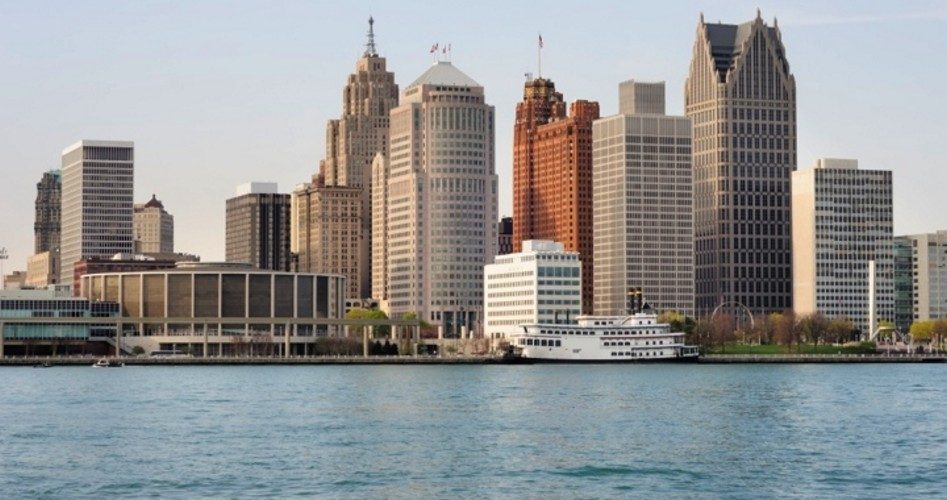
The so-called grand bargain that Detroit’s emergency financial manager rolled out on Friday — all 440 pages of it — was welcomed by Michigan Governor Rick Snyder with words that perfectly encapsulated the nearly year-long effort to settle the city’s bankruptcy:
Kevyn Orr has submitted a thoughtful, comprehensive blueprint directing the city back to solid financial ground … [but] there will be difficult decisions and challenges for all sides as this process moves forward.
Those difficulties became more and more apparent as Orr tried to squeeze five pounds of sugar out of a two-pound bag. The city owes $18 billion that it cannot pay. Its two pension funds are, depending who is asked, between $3 billion and $5 billion underfunded. The city’s medical benefits plan for its 23,500 retirees is in shambles. There are 78,000 deserted houses that are blighting neighborhoods across the city. Half the ambulances don’t work. The police cruisers need to be replaced. The city’s computer system is so outdated as to be nearly nonfunctioning. Many streetlights don’t work. Owners of real estate are $250 million in arrears in paying their taxes. Crime continues to set the wrong kind of records.
The grand bargain that Orr has cobbled together is incredibly complicated. First, he wants to make every effort to capture the $815 million being offered by the governor, a mixture of state funds redirected from tobacco settlement funds, private foundation grants, and money from supporters of the Detroit Institute of Art to keep its treasures from being liquidated. The plan includes transferring the water district to outside management, who will then make payments back to the city while paying off its water bonds. Orr wants to move management of the city’s two pension plans elsewhere, to avoid the nonsense of the “13th-month” disbursements every year which hastened the financial demise of the city.
Orr thinks everyone should pay up, some more, some less, but almost no one gets off scot-free. Orr tried negotiating with Bank of America, UBS, and Financial Guaranty to bring down what the city owed on the failed interest rate swaps from $300 million. His first two efforts were quashed by the bankruptcy trustee, and a final successful settlement is in the works, to be announced next week. It’s rumored that the holders of those failed swaps — the banks and insurance companies — will lose more than half their money.
Orr has filed suit against those banks as well, claiming that the COPs (certificates of participation) that were arranged while former Mayor Kwame Kilpatrick was in office were illegal. If successful, that will neatly erase $1.4 billion from the city’s owed column.
Bondholders whose interests are collateralized will be made whole while those holding unsecured positions (uncollateralized general obligation bonds) will lose 80 percent of their investments. Unions will see their benefits cut: the police and fire retirees getting a 10 percent haircut, with other city retirees losing a third of their benefits.
The unions will have their rules modified and their controls over pension plan assets shifted elsewhere. And the actuarial assumptions guiding those plans will be more realistic. The administration of the city will operate under different, more transparent, rules.
The union pushback was immediate as expected. Said Bruce Babiarz, a spokesman for Detroit’s fire and police pension board:
We believe the City of Detroit can afford much better treatment of its pension beneficiaries who [have] dedicated years of their lives in service of the city.
We believe there are reasonable and viable options that could negate the need for [these] drastic pension cuts.
President Al Garrett, representing the city’s employees, wasn’t nearly as nice:
The proposed plan of adjustment is a gut punch to Detroit city workers and retirees. [Orr’s] plan essentially eliminates health care benefits for retirees and drastically cuts earned pension benefits.
Retirees cannot survive these huge cuts to the pensions they earned. The plan is unfair and unacceptable.
Creditors were equally unhappy while slightly less histrionic. Wrote Steve Spencer, an adviser to Financial Guaranty Insurance:
While we understand that favoring pensioners and discriminating against bondholders and other creditors might be politically popular, we believe this is contrary to bankruptcy law and will result in costly litigation.
Orr saw this coming, having been involved in trying to pull rabbits out of the hat in numerous other bankruptcy cases: “For 30 years, I’ve been doing restructuring, and I’ve never entered a case where any unsecured creditor thought their cut was fair,” he observed.
There are so many players — more than 100,000 creditors — in the settlement that interests from Lansing to Switzerland are involved. There are Republicans in the statehouse running for reelection who want to help Detroit but don’t want to labelled with providing the city with a bailout. There are Democrats weeping over the plights of people such as Albert Jackson, now age 77 and barely scraping by on his pension of $488 a month. Said Jackson, “If it weren’t for social security, I wouldn’t survive.” Further cuts to his monthly check would make it “hard to pay for rent, buy food, put gas in the car. It’s almost impossible now,” said Jackson.
Part of Orr’s plan is to begin to rehabilitate the city’s infrastructure. The pace of demolishing trashed-out homes will triple to 450 a week. New computer systems will be installed downtown. New ambulances and police cruisers will be purchased. Fire and police facilities will undergo facelifts.
Here are some of the details from Orr that are now waiting for approval on the desk of U.S. Bankruptcy Judge Stephen Rhodes:
• Police and fire department pensions will be cut up to 10 percent;
• Other city employees’ pensions will be cut up to 34 percent;
• General obligation creditors will get 20 cents on the dollar;
• Secured creditors will get all their money;
• $365 million of the grand bargain will come from foundations and individuals;
• $100 million will come from supporters of Detroit’s Institute of Art;
• $350 million will come from Lansing by redirecting part of the state’s tobacco settlement payments;
• $1.5 billion will be spent over the next 10 years to improve the city’s infrastructure; and
•$520 million will be spent over the next six years getting rid of 78,000 uninhabitable houses.
All this is far from a done deal. There are lawsuits to be filed, complaints to be heard, and heart-rending stories to be told. Great will be the gnashing of teeth by nearly everyone close to the disaster that once was Detroit.
The dust will settle. Difficulties will be resolved. Compromises will be made and accepted. Lawsuits will be settled. Pain will be endured. Standards of living will be reduced still further.
But police response times and emergency medical services will improve. Street lights will be turned back on. Crime will be reduced.
The new Detroit will emerge from four decades of mismanagement, overzealous union influence, political corruption, Wall Street opportunism, extra-legal machinations, and backroom deals. Detroit will survive. It will be smaller, safer, cleaner, freer. The patient will recover from the necessary painful surgery and survive to live, and perhaps even to prosper, another day.
A graduate of Cornell University and a former investment advisor, Bob is a regular contributor to The New American magazine and blogs frequently at www.LightFromTheRight.com, primarily on economics and politics. He can be reached at [email protected].



